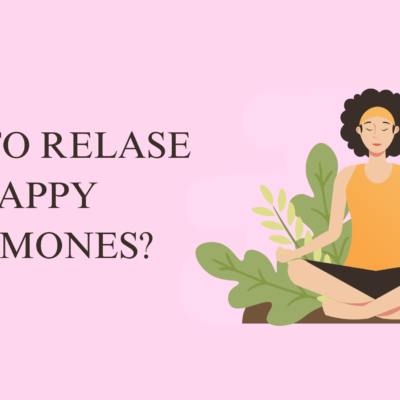How to Release Happy Hormones: Have you ever wondered why some days you feel energetic and joyful while on other days, you feel sluggish and down? Your mood, energy levels, and overall sense of well-being are largely influenced by happy hormones—chemicals in your body that regulate emotions, reduce stress, and promote happiness.
Understanding these hormones and how to naturally boost their levels can help you maintain a positive mindset and improve your mental and physical health. In this article, we’ll explore the four main happy hormones, their functions, and practical ways to increase them for a happier, healthier life.
Also Read:
- How to Get Rid of My Negative Thoughts?
- How to Get Over Extreme Social Anxiety?
- How to Stop Overthinking and Obsessive Thoughts?
What Are Happy Hormones?
Happy hormones are neurotransmitters and chemicals that help regulate mood, emotions, and overall mental well-being. These include:
- Dopamine – The “feel-good” hormone that boosts motivation and pleasure.
- Serotonin – The “mood stabilizer” that promotes happiness and emotional balance.
- Oxytocin – The “love hormone” that strengthens bonds and trust in relationships.
- Endorphins – The “pain relievers” that reduce stress and boost happiness.
By naturally increasing these hormones, you can enhance your mood, reduce stress, and live a more fulfilling life.
1. Dopamine: The Motivation and Reward Hormone
What Is Dopamine?
Dopamine is responsible for feelings of pleasure, motivation, and reward. It plays a crucial role in goal-setting, productivity, and forming good habits. When dopamine levels are high, you feel excited, driven, and accomplished. However, low dopamine levels can lead to lack of motivation, fatigue, and even depression.
How to Naturally Boost Dopamine
a) Set and Achieve Goals
- Break large goals into smaller, manageable tasks.
- Celebrate small victories to create a sense of achievement.
- Keep a to-do list and check off completed tasks.
b) Eat Dopamine-Boosting Foods
- Bananas, avocados, nuts, and dark chocolate.
- Lean proteins like fish, chicken, and eggs.
- Green leafy vegetables and probiotics (yogurt, kefir).
c) Exercise Regularly
- Physical activity releases dopamine, improving mood and energy levels.
- Activities like running, cycling, or dancing help sustain dopamine production.
d) Listen to Music
- Upbeat, energetic music can increase dopamine release, making you feel happier and more motivated.
2. Serotonin: The Mood Stabilizer
What Is Serotonin?
Serotonin is a neurotransmitter that regulates mood, sleep, appetite, and digestion. It helps maintain emotional balance and reduces feelings of stress and anxiety. Low serotonin levels are linked to depression, mood swings, and insomnia.
How to Naturally Boost Serotonin
a) Get Sunlight Exposure
- Sunlight stimulates serotonin production, improving mood and energy levels.
- Spend at least 15–30 minutes outdoors daily, especially in the morning.
b) Exercise and Yoga
- Aerobic exercises like swimming, cycling, and jogging increase serotonin levels.
- Yoga and stretching exercises improve relaxation and serotonin production.
c) Eat Serotonin-Boosting Foods
- Foods rich in tryptophan (an amino acid that produces serotonin) include:
- Turkey, eggs, and cheese.
- Salmon and nuts.
- Oats, bananas, and dark chocolate.
d) Practice Gratitude and Mindfulness
- Writing down things you’re grateful for increases serotonin and reduces negative thinking.
- Mindful breathing and meditation promote serotonin release and emotional stability.
3. Oxytocin: The Love and Bonding Hormone
What Is Oxytocin?
Oxytocin is known as the “love hormone” because it plays a key role in social bonding, trust, and emotional connection. It helps deepen relationships and reduces stress and anxiety. Low oxytocin levels can lead to loneliness, relationship difficulties, and a lack of emotional connection.
How to Naturally Boost Oxytocin
a) Hugging and Physical Touch
- Hugging, kissing, and holding hands release oxytocin, strengthening bonds.
- Cuddling with pets or loved ones also increases oxytocin levels.
b) Spend Quality Time with Loved Ones
- Engaging in deep conversations and sharing experiences fosters trust and emotional connection.
- Acts of kindness, like giving compliments or helping others, increase oxytocin.
c) Engage in Social Activities
- Spending time with friends and family boosts oxytocin and emotional well-being.
- Volunteering and helping others increase feelings of love and connection.
d) Meditation and Deep Breathing
- Loving-kindness meditation (focusing on sending love and positive thoughts to others) enhances oxytocin levels.
4. Endorphins: The Natural Pain Relievers
What Are Endorphins?
Endorphins are the body’s natural painkillers, reducing stress and increasing feelings of pleasure and well-being. They are released during physical activity, laughter, and enjoyable experiences. Low endorphin levels can lead to chronic stress, mood disorders, and increased sensitivity to pain.
How to Naturally Boost Endorphins
a) Exercise and Physical Activity
- High-intensity workouts like running, swimming, or dancing release endorphins.
- Even light activities like walking or stretching can improve mood.
b) Laughter and Fun Activities
- Watching comedy movies, joking with friends, or engaging in fun activities boosts endorphins.
- Laughter therapy has been shown to reduce stress and increase happiness.
c) Eat Endorphin-Boosting Foods
- Dark chocolate, spicy foods (like chili peppers), and citrus fruits help increase endorphins.
d) Listen to Music and Dance
- Upbeat music and dancing trigger endorphin release, making you feel energized and happy.
Other Lifestyle Tips for Balancing Happy Hormones
1. Prioritize Sleep
- Poor sleep disrupts hormone levels, leading to irritability and mood swings.
- Aim for 7–9 hours of quality sleep each night.
2. Reduce Stress and Practice Relaxation Techniques
- Deep breathing, meditation, and nature walks reduce cortisol (the stress hormone) and increase happy hormones.
3. Avoid Excessive Social Media and Negative News
- Too much screen time can lower dopamine and serotonin levels.
- Limit social media use and focus on real-life connections.
4. Stay Hydrated
- Dehydration affects brain function and hormone balance. Drink at least 2–3 liters of water daily.
Conclusion
Happy hormones play a vital role in shaping our emotions, motivation, and overall well-being. By making small changes in your daily routine—such as exercising, eating nutritious foods, spending time with loved ones, and practicing mindfulness—you can naturally boost these feel-good chemicals.
Happiness is not just about luck; it’s about creating a lifestyle that supports positive emotions. Prioritize self-care, surround yourself with positivity, and take proactive steps to keep your happy hormones balanced. A happier, healthier life is within your reach!








